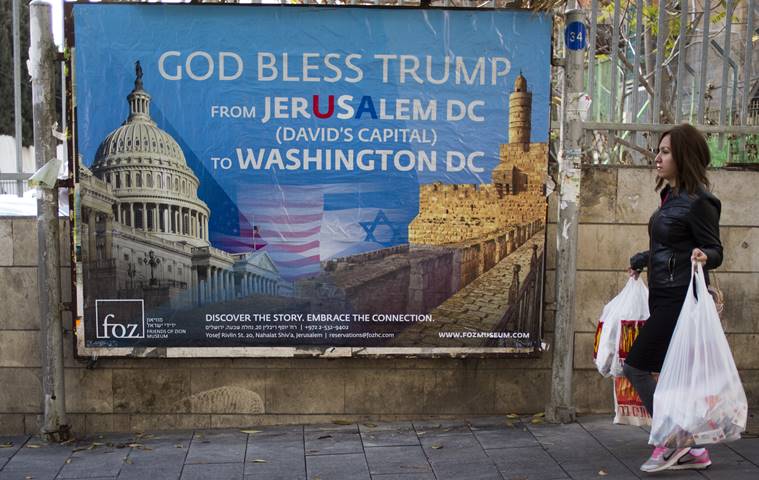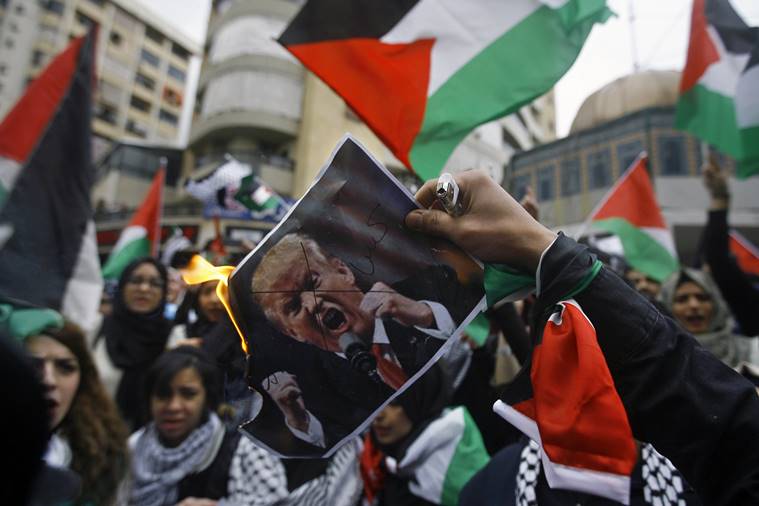International News
US finds few backers of Jerusalem move, world leaders say can provoke “dangerous consequences”
The US, as of now, is not formally joined by any other nation in recognition of Jerusalem as Israel’s capital and currently stands completely at odds with the international opinion.

“Israel is a sovereign nation with the right like any other sovereign nation to determine its own capital. Acknowledging this as a fact is a necessary condition for achieving peace,” US President Donald Trump said in his Wednesday, December 6 address, amidst a clamor of imploring and warnings from foreign leaders in Arab, Muslim and European countries to not do so. He also kicked off the process of moving the American embassy from Tel Aviv to Jerusalem by giving directions for arrangements to be made in that direction. Protests, including violent ones, by Palestinians, who were particularly stunned by this move, broke almost right away in Jerusalem and Palestinian territories — resulting in tension escalation, and counter-attacks and beefed up security by the Israeli army on Thursday and Friday.
Israel claims Jerusalem in its entirety as its “eternal, undivided” capital, while the Palestinians claim East Jerusalem, with a predominantly Arab population, as the capital of a future Palestinian state. While recognising it as Israel’s capital, Trump did not explicitly refer to Jerusalem as ‘undivided’ — the way it is claimed by Israel — and said that the US would support a two-state solution. In other words, his statement does not actually preclude the Palestinians from establishing their capital in the east of the city in the future.
What Trump’s recognition of Jerusalem achieves
Hence Trump did not veer too sharply from the traditional American position that Jerusalem’s status must be decided through negotiations between Israel and Palestine, a fact that was emphasised by White House officials in the assertion that it was a “reflection of the ground realities”. Many Jewish-American groups within the US such as American-Israel Public Affairs Committee have welcomed the recognition as “historic” and a long-overdue step to implement the US law. Yet, the clumsily-enacted move, especially lacking in international consensus, has done the damage at the level of perception. Above all, it has cast serious doubt in the minds of Palestinians about the US’s potential to act as a ‘neutral’ mediator in any future negotiations between the two sides.
While Trump said in his speech that he “judged this course of action to be in the best interests of the United States of America and the pursuit of peace between Israel and the Palestinians,” in the wake of the recent clashes and hurt sentiments, it remains unclear how his declaration would help peace or in bringing Palestinians on board. In long-standing, emotionally charged conflicts like Jerusalem, perceptions — however mistaken — can be as weighty as facts themselves.
The upside of the recognition is not much and it does not advance American interests in the Middle-East. “If you’re going to upend decades of US policy, it ought to be for a good reason and for a significant political and diplomatic gain. I don’t see that either of those two are attained here,” James Cunningham, who served as the United States ambassador to Israel from 2008–2011, told the Washington DC-based think tank Atlantic Council.
“The move would go against the very priorities that the administration has set for itself in the Middle East: fighting Islamist militancy and confronting Iranian influence,” wrote Shibley Telhami of Washington DC based Brookings Institute. “Jerusalem is the perfect issue for Iran and Islamist militants to use to mobilize support against the United States and those who endorse its policies.”
International stance in wake of Trump’s address
The US, as of now, is not formally joined by any other nation in recognition of Jerusalem as Israel’s capital and currently stands completely at odds with the international opinion. Many of Washington’s close allies had warned against the move. A UN Security Council meeting has been requested by several countries on the 15-member-council in the wake of global criticism of Donald Trump’s statement that is held in breach of international law as well as UN resolutions and in potential to provoke “dangerous consequences”.
Israel
 A woman walks past a poster praising U.S. President Donald Trump’s recognition of Jerusalem as Israel’s capital, in Jerusalem, Thursday, Dec. 7, 2017. (AP Photo/Ariel Schalit)
A woman walks past a poster praising U.S. President Donald Trump’s recognition of Jerusalem as Israel’s capital, in Jerusalem, Thursday, Dec. 7, 2017. (AP Photo/Ariel Schalit)
Trump’s recognition of Jerusalem was understandably, immediately welcomed in Israel, however Israeli leaders appear to be nearly the only foreign officials delighted. Israeli Prime Minister Benjamin Netanyahu said that Trump’s recognition of Jerusalem “is an important step towards peace.”
Palestinian territories
The move, perceived as US coming down in favor of Israel, almost immediately drew indignation, protests and ire from the Palestinians. Palestinian Authority President Mahmoud Abbas said that it’s a declaration that the US is withdrawing from being a sponsor of the peace process. Hamas leader Ismail Haniya, in a speech on Thursday in Gaza city, said that President Trump’s recognition of Jerusalem “killed” the Israeli-Palestinian peace process, Al Jazeera reported. Palestinian diplomat Saeb Erekat described Trump’s decision as destructive of “all moderates in the region and giving power to extremists”. Jibril Rajoub, a senior Palestinian official, said on Thursday that US Vice President Mike Pence is no longer welcome in the occupied territories during his scheduled visit in the second half of December.
Leaders of Lebanon, Jordan, Iran and Qatar have variously denounced the decision as one that will threaten the stability of the region and the peace process between the two sides.
 Lebanese and Palestinians students, burn a poster of U.S. President Donald Trump as they take part in a protest, in the southern port city of Sidon, Lebanon, Thursday, Dec. 7, 2017. (AP Photo/Mohammed Zaatari)
Lebanese and Palestinians students, burn a poster of U.S. President Donald Trump as they take part in a protest, in the southern port city of Sidon, Lebanon, Thursday, Dec. 7, 2017. (AP Photo/Mohammed Zaatari)
Saudi Arabia and Turkey
While Saudi Arabia referred to the move as “unjustified and irresponsible,” Turkish President Recep Tayyip Erdogan criticised Trump’s stance by saying that it would throw the (Middle-East) region into “a ring of fire” and added that the US decision disregarded a 1980 United Nations resolution regarding the status of the city.
European voices
“We believe it is unhelpful in terms of prospects for peace in the region,” British Prime Minister Theresa May has said. “The British Embassy to Israel is based in Tel Aviv and we have no plans to move it.” French President Emmanuel Macron referred to it as “a regrettable decision” and said that “France does not approve, it contradicts international law and it ignores UN Security Council resolutions”.
Donald Trump’s general disregard for international law has been no secret, and his handling of the Jerusalem issue is the newest manifestation of it. Analysts find it difficult to see any benefit of Trump’s Jerusalem move, which has been made just a few months in advance of his administration’s plans to bring out a solution to settle the Israel-Palestine conflict. With the further obliteration of Palestinians’ faith in the US that Jerusalem address has brought, it would be likely very tricky to get them on board for any meaningful resolution.




